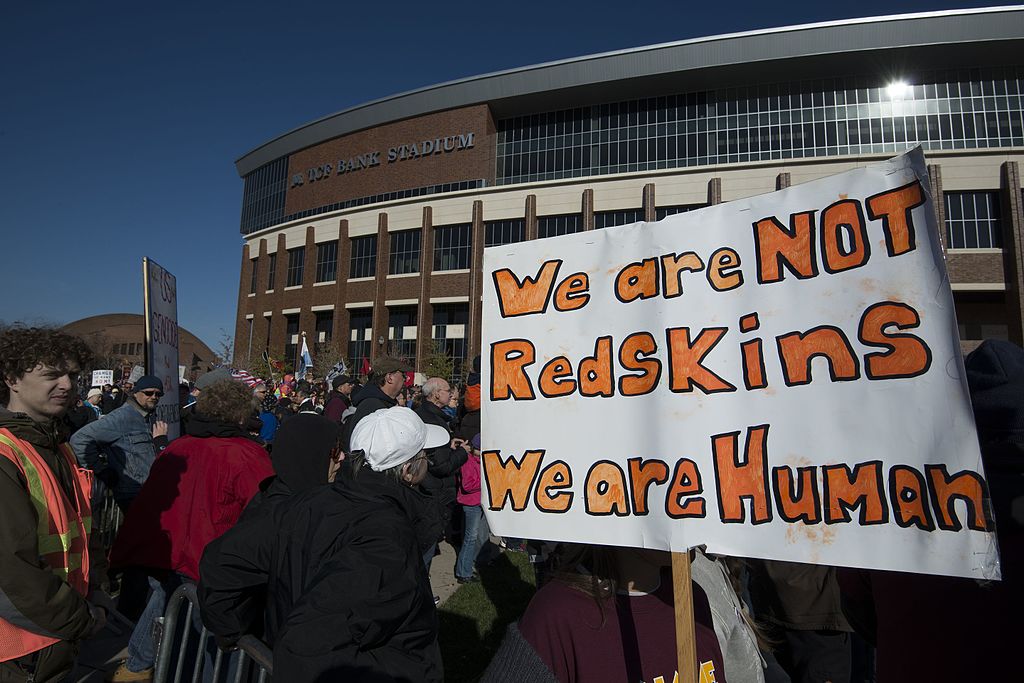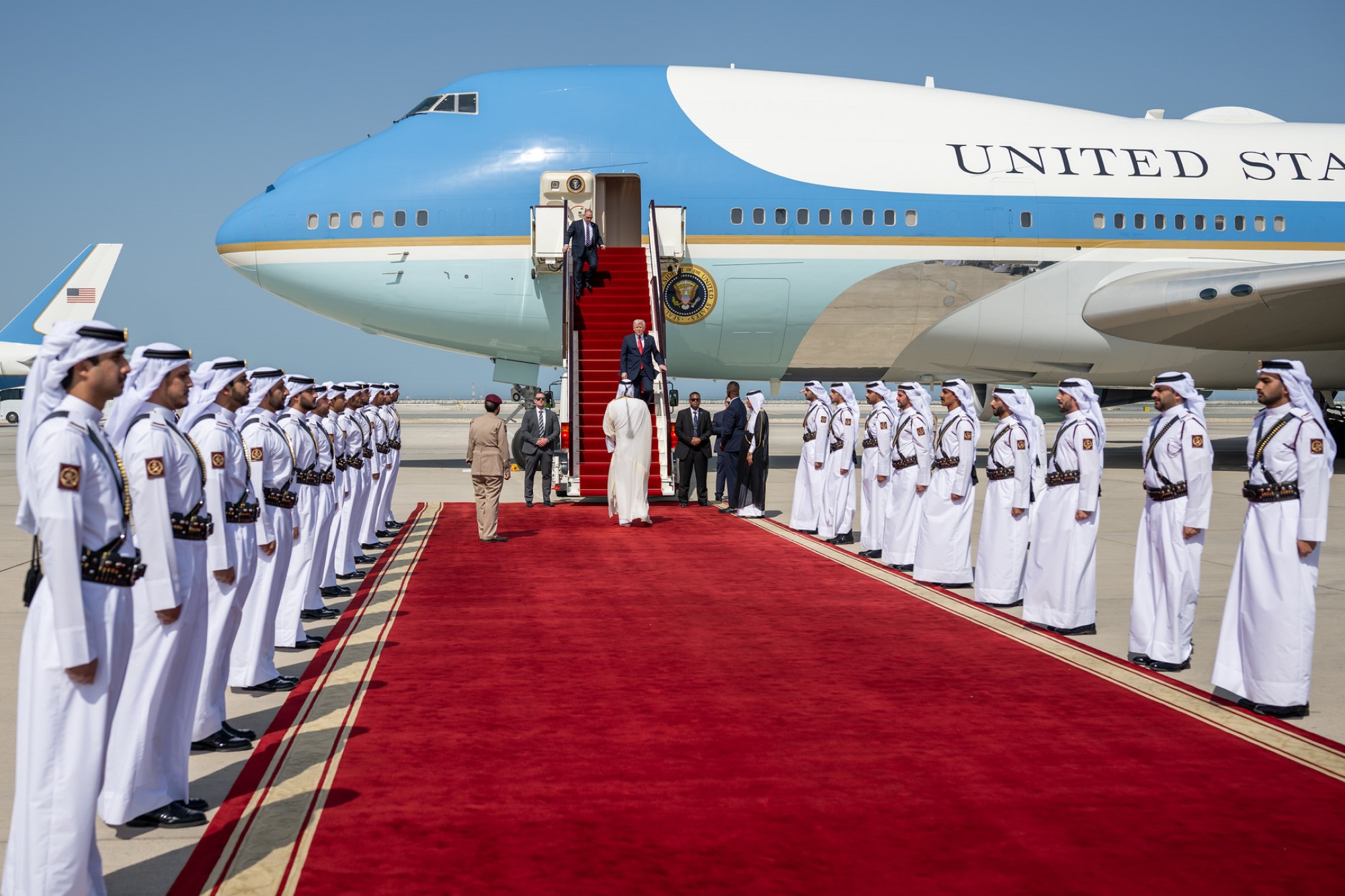From the Field to the Podium, Appropriating Native American Culture
A stereotypical Native American profile—skin the color of cherry oak, braid twisting over his right shoulder, pensive expression, large nose, and feathers in his hair—is branded onto helmets, the stadium’s field, banners, hats, shirts, couches, shot glasses, rugs, slippers, and robes. You name it, and the Washington Redskins sell it as the football team’s merchandise.
Given Washington Redskins tickets when they first moved to the state, Suzan Shown Harjo (Cheyenne/Hodulgee Muscogee) and her husband attended half of the football game before leaving. The event reaffirmed the importance of Harjo’s activism: she has spearheaded a movement for almost 60 years that persuades sports teams to change Native mascots that could be offensive to Native Americans. According to the New York Times, over two-thirds of teams have complied or voluntarily dropped the mascot without incident. Yet the Washington Redskins — the professional football team that further ignited Harjo’s drive to develop this movement — still has not shown a willingness to change their mascot.
According to The Washington Times, in order to display the potential widespread acceptance and positive feedback of a mascot change, a group — self-identified as the “activists Rising Hearts” — created fake websites, mocking the Washington Redskins’ website as well as those of other sports and news outlets, to announce the team’s mascot change from Redskins to Redhawks. The hoax caught enough attention for the Washington Redskins to release a response: “The name of the team is the Washington Redskins and will remain that for the future.” Rebecca Nagle of the Cherokee Nation and one of the organizers of the protest said, “What we’re asking for changes only four letters. Just four letters! Certainly, the harm that the mascot does to Native Americans outweighs the very, very minor changes the franchise would need to make.”
President Obama expressed his opinion about the NFL team’s name back in 2013: “If I were the owner of the team and I knew that there was a name of my team—even if it had a storied history—that was offending a sizeable group of people, I’d think about changing it.” Obama’s attempted intervention in the matter was unsuccessful. He received disapproval from then-businessman Donald Trump, who tweeted: “President should not be telling the Washington Redskins to change their name-our country has far bigger problems! FOCUS on them, not nonsense.” Yet two years later Trump did not hesitate to share his own opinion about the matter, asserting that he does not believe that the Redskins should change their mascot.
Though he disapproved of Obama sharing his opinion on a sports matter, Trump’s ironic intervention in the NFL only increased. In response to NFL players — starting with Colin Kaepernick in 2016 — kneeling during the National Anthem to protest racism and police brutality, Trump fired off many tweets that urged the NFL to prohibit such protests, condemned the actions of the players who have knelt during the anthem, and implored patriotic citizens to boycott the NFL until it fires or suspends players that kneel.
CBS News conducted a poll to gauge people’s reactions, breaking them down further by political views and race, finding that whether or not they approved of the protests, most people did not condone Trump’s responses. Trump’s opinions on the Washington Redskins’ mascot did not elicit as much attention, but it spurred its own set of polling.
Deeming the Redskins a “positive” name, Trump claimed to “know Indians that are extremely proud of that name.” The Washington Post claimed to have found just that: “Nine in 10 Native Americans say they are not offended by the Washington Redskins name”; “7 in 10 said they did not feel the word “Redskin” was disrespectful to Indians”; and “8 in 10 . . . said they would not be offended if a non-native called them that name.” With those overwhelmingly convincing statistics, Jacqueline Keeler—a Navajo/Yankton Dakota Sioux essayist, activist, and writer—claimed, “Given that I have 50 first cousins who are enrolled in the Navajo and Yankton Dakota Sioux Nations, none of whom likes the team name, I found the results to be curious.”
Keeler exposed The Washington Post’s irresponsible polling methodology, sensing that the news outlet may be biased due the fact that the Washington Redskins is “the local NFL franchise that the Post covers.” Alongside disproportionate demographics, improper age distribution (only 15 percent of respondents were under the age of 29), and the exclusion of youths under the age of 18 who may have a Native mascot at their schools, one of the greatest faults of the poll was its reliance on self-identification: “56 percent of those asked said they were not part of any tribal nation or could not name what tribe their ancestors claimed.”
Even if the Washington Post had come to discover that 90 percent of Native Americans are not offended by the mascot through responsible polling methods, the findings would still be troubling: the American Psychological Association asserts that “Native youth suffer measurably lower self-esteem after exposure to a Native American mascot. It also found that Native respondents who claim to be okay with Native mascots actually experience a greater drop in self-esteem.” An NFL team and the news outlet that covers its games should not be attempting to convince the public that this appropriation is okay at the risk of Native Americans internalizing negative messages about their culture. Though Trump deemed the mascot controversy to be a proposed change toward “unnecessary political correctness,” appropriating Native mascots as the face of a football team renders a massive power imbalance between a $1.6 billion team and a historically oppressed population.
Though he supported the Redskins’ trivialization of a cultural appropriation, Trump has maintained the guise of defending Native Americans when it politically suits him. Massachusetts Senator Elizabeth Warren has not been able to prove her Native ancestry to the Cherokee groups that have demanded her documentation. Trump and others have accused Warren of using her claim of ethnicity in order to secure her past positions at esteemed law schools. Yet setting aside Warren’s own potential immorality and exploitation of a Native identity, Trump explicitly demeans Native Americans in his hypocritical response on Twitter: “Goofy Elizabeth Warren, sometimes referred to as Pocahontas, pretended to be a Native American in order to advance her career. Very racist!”
Almost a year and a half later, Trump has still been using his coined derogatory nickname for Warren. In another tweet that Trump published just three days into November, which the White House recently declared as Native American Heritage Month, he said, “Pocahontas just stated that the Democrats, led by the legendary Crooked Hillary Clinton, rigged the Primaries! Lets go FBI & Justice Dept.”
Within the same month, at a ceremony honoring Navajo veterans who served in World War II, Trump distracted from the veterans standing next to him—one of whom just finished speaking to honor his comrades—in order to revive his derogatory insult: “Although, we have a representative in Congress who has been here a long time … longer than you — they call her Pocahontas!” In her New York Times article, Sierra Teller Ornelas, a “Navajo, born into the Edgewater clan and for the Mexican clan,” commented on the president’s conduct during the celebration: “Last week, I watched our president interrupt a White House ceremony honoring the Navajo code talkers to degrade Senator Elizabeth Warren by referring to her as Pocahontas. In front of a painting of the signer of the Indian Removal Act himself, Andrew Jackson.”
Trump has likened himself to Jackson in the past. In celebration of Jackson’s birthday, Trump delivered a speech in Nashville in which he stated: “It was during the revolution that Jackson first confronted and defied an arrogant elite. Does that sound familiar? I wonder why they keep talking about Trump and Jackson, Jackson and Trump.”
In 1814, the Cherokee aided Andrew Jackson at the Battle of Horseshoe Bend, in which they most likely not only saved his army and life but also provided him with a well-known military victory that would launch him down a path of fame to the presidency. Yet just 16 years later, as president, Jackson ordered the Indian Removal Act that forcefully displaced Native Americans from southeast states: “An estimated 4,000 died from hunger, exposure, and disease. The journey became a cultural memory as the “trail where they cried” for the Cherokees and other removed tribes. Today it is widely remembered by the general public as the “Trail of Tears.’”
With a long history of military service that goes back hundreds of years, Native Americans are still very active in the military. Citing the U.S. Department of Defense, Indian Country Today reported that in 2010 “while the U.S. population recorded nearly 1.4 percent American Indian, the military population was 1.7 percent Native, making it the highest per-capita commitment of any ethnic population to defend the United States.”
The fact that Trump and his administration held a ceremony that honors the military service of Native Americans under the watching portrait of one of their historical persecutors is a dishearteningly symbolic and ironic repetition of history. Whether from the football stadium or the president’s podium, Native American slurs and degradations cannot continue to be normalized. Slighting the celebration of the codebreakers, Trump used his Pocahontas slur in order to advance his political agenda. The Washington Redskins exploit Native American culture for their own profit-driven motives as well. Native Americans should certainly not be expected to accept and internalize these harmful stereotypes of their culture. They should not have to speak out in overwhelming resistance to earn respect. And when they do, people should listen.
Paying his own tribute—the kind that Trump failed to deliver—to the Marines’ service, Ornelas reflects: “many Navajos, the code talkers specifically, truly love this country, despite everything it’s done to try to erase us from it. And in three years who knows where the president will be, but I know those proud Marine veterans will still be representing their land and its people. They inspire us to remember that in the recesses of our discouraging past, there are still flashes of grace, dignity, and bravery. I hold onto that notion every day.”





